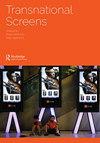“跨国电影,跨国记忆?”近代泛亚战争电影中的集体记忆
IF 0.4
0 FILM, RADIO, TELEVISION
引用次数: 0
摘要
本文通过分析三部泛亚洲电影来探讨东亚的记忆冲突,这三部电影试图产生关于第二次世界大战的共同跨国记忆:《紫色日落》(中国,2001年)、《遥远的债券》(日本,2009年)和《我的路》(韩国,2011年)。利用Hjort的跨国电影分类法(2009),本文认为这三部电影都是通过亲和的跨国主义(基于共同文化遗产的跨国记忆)来吸引泛亚跨国记忆的,但它们的总体跨国战略却分化为世界主义、现代化和全球化的跨国主义。每种策略在国内外受众中都取得了不同程度的成功,这表明在东亚背景下,跨国记忆的文化生产仍然是难以捉摸的。本文最后的问题是,在东亚电影中,有凝聚力的跨国战争记忆是否可能,更广泛地说,泛亚跨国电影制作的更强趋势如何在二战等有争议的话题之外出现。本文章由计算机程序翻译,如有差异,请以英文原文为准。
‘Transnational film, transnational memory? Collective remembrance in recent pan-asian war films’
ABSTRACT This paper explores the conflict over memory in East Asia by analyzing three pan-Asian film productions that attempt to produce a shared transnational memory of World War II: Purple Sunset (China, 2001), Distant Bonds (Japan, 2009), and My Way (South Korea, 2011). Using Hjort’s taxonomy of transnational cinemas (2009), it argues that all three productions appeal to pan-Asian transnational memory through affinitive transnationalism (transnational memory based on shared cultural heritage), but their overall transnational strategies diverge into cosmopolitan, modernizing, and globalizing transnationalism. Each strategy works to varying success for domestic and international audiences, suggesting that the cultural production of transnational memory remains elusive in the East Asian context. This paper ends with the question of whether cohesive transnational war memory is possible in East Asian cinema, and more broadly, how a stronger trend of pan-Asian transnational filmmaking might emerge outside of contested topics like World War II.
求助全文
通过发布文献求助,成功后即可免费获取论文全文。
去求助
来源期刊

Transnational Screens
Arts and Humanities-Visual Arts and Performing Arts
CiteScore
0.60
自引率
0.00%
发文量
23
 求助内容:
求助内容: 应助结果提醒方式:
应助结果提醒方式:


